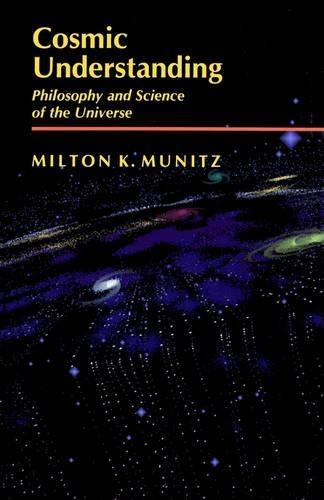Overview
Given the prevailing consensus among cosmologists that the universe had its beginning approximately 15 billion years ago, and that it will reach its end in the remote yet foreseeable future, we face the momentous intellectual challenge of how to assimilate these scientific claims into our fundamental world view. In this work the distinguished philosopher Milton Munitz provides a lucid account of the chief empirical findings and theories of recent cosmology and a systematic assessment of their broader philosophical implications.
Full Product Details
Author: Milton K. Munitz
Publisher: Princeton University Press
Imprint: Princeton University Press
Dimensions:
Width: 14.00cm
, Height: 1.70cm
, Length: 21.60cm
Weight: 0.369kg
ISBN: 9780691020594
ISBN 10: 0691020590
Pages: 298
Publication Date: 04 February 1990
Audience:
Professional and scholarly
,
College/higher education
,
Professional & Vocational
,
Tertiary & Higher Education
Format: Paperback
Publisher's Status: Active
Availability: Manufactured on demand

We will order this item for you from a manufactured on demand supplier.
Language: English
Reviews
The great merit of this book is that it provides a contemporary approach to the treatment of questions central to classical Western philosophy and religion, e.g., What is the nature and origin of the universe? Does the universe have a purpose? The method has its source both in contemporary science and in philosophy. -- Choice This is a book to be argued with, argued from, listened to, objected to, learned from, respected, agreed with, and disagreed with... Munitz, far from proposing all the answers in either the philosophical or the physical discussions, poses the questions and provides tantalizing directions of inquiry for the reader. -- Paul A. Robinson, Jr., The Christian Science Monitor For those who live with complete faith in the power of reason and who believe that the observable cosmos is all there is or was or ever will be, Munitz's Cosmic Understanding should be a profoundly disturbing book. In a thoughtful and closely structured account, Munitz defends two intertwined concepts. First, reality, often depicted solely as a simple physical process, albeit wondrous and infinite, is actually something mysteriously deeper. In particular, he argues that the evolutionary nature of the universe points to some larger transcendental quality. Secondly, he reasons that the perceptual world is a human construct, always only incompletely knowable... he has argued brilliantly for the depth and thickness of reality. -- Owen Gingerich, Nature
The great merit of this book is that it provides a contemporary approach to the treatment of questions central to classical Western philosophy and religion, e.g., What is the nature and origin of the universe? Does the universe have a purpose? The method has its source both in contemporary science and in philosophy. -- Choice This is a book to be argued with, argued from, listened to, objected to, learned from, respected, agreed with, and disagreed with... Munitz, far from proposing all the answers in either the philosophical or the physical discussions, poses the questions and provides tantalizing directions of inquiry for the reader. -- Paul A. Robinson, Jr., The Christian Science Monitor For those who live with complete faith in the power of reason and who believe that the observable cosmos is all there is or was or ever will be, Munitz's Cosmic Understanding should be a profoundly disturbing book. In a thoughtful and closely structured account, Munitz defends two intertwined concepts. First, reality, often depicted solely as a simple physical process, albeit wondrous and infinite, is actually something mysteriously deeper. In particular, he argues that the evolutionary nature of the universe points to some larger transcendental quality. Secondly, he reasons that the perceptual world is a human construct, always only incompletely knowable... he has argued brilliantly for the depth and thickness of reality. -- Owen Gingerich, Nature
The great merit of this book is that it provides a contemporary approach to the treatment of questions central to classical Western philosophy and religion, e.g., What is the nature and origin of the universe? Does the universe have a purpose? The method has its source both in contemporary science and in philosophy. Choice This is a book to be argued with, argued from, listened to, objected to, learned from, respected, agreed with, and disagreed with... Munitz, far from proposing all the answers in either the philosophical or the physical discussions, poses the questions and provides tantalizing directions of inquiry for the reader. -- Paul A. Robinson, Jr. The Christian Science Monitor For those who live with complete faith in the power of reason and who believe that the observable cosmos is all there is or was or ever will be, Munitz's Cosmic Understanding should be a profoundly disturbing book. In a thoughtful and closely structured account, Munitz defends two intertwined concepts. First, reality, often depicted solely as a simple physical process, albeit wondrous and infinite, is actually something mysteriously deeper. In particular, he argues that the evolutionary nature of the universe points to some larger transcendental quality. Secondly, he reasons that the perceptual world is a human construct, always only incompletely knowable... he has argued brilliantly for the depth and thickness of reality. -- Owen Gingerich Nature
Author Information
Milton K. Munitz is Distinguished Professor of Philosophy Emeritus at the City University of New York. Among his numerous works on the philosophical ramifications of cosmology is The Question of Reality (Princeton).



